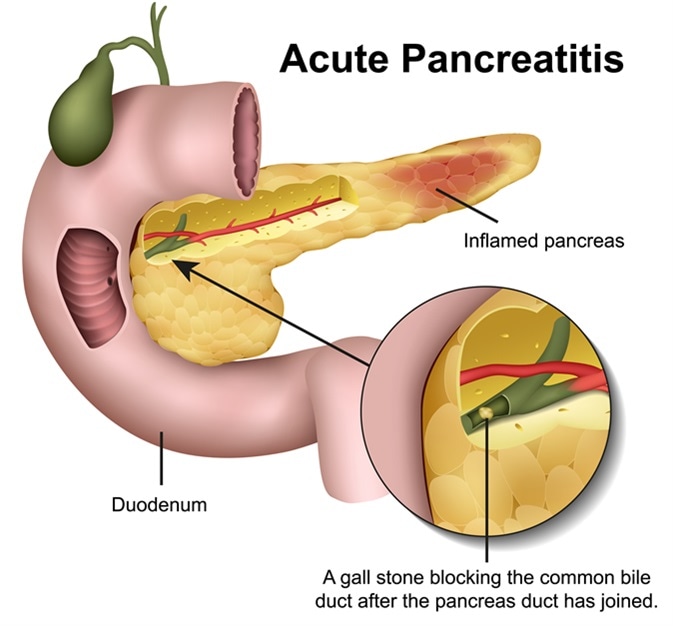Inflammation of the pancreas is referred to as pancreatitis. The pancreas is a flat tadpole-shaped gland located at the back of the stomach in the upper abdomen; it releases certain enzymes and hormones which help in digestion and aids in regulating sugar metabolism in the body.
Pancreatitis may manifest in both severe and acute forms. The acute form of pancreatitis manifests abruptly and usually subsides within a few days; however, chronic pancreatitis may persist for several years. The chronic form can result in serious complications like kidney failure, diabetes, malnutrition, and pancreatic cancer.

Acute pancreatitis 3d illustration. Image Credit: medicalstocks / Shutterstock
What are the causes and symptoms of pancreatitis?
The prime cause of pancreatitis is the over-activation of digestive enzymes, which results in inflammation of the pancreatic cells. It has been observed that repeated episodes of acute pancreatitis eventually result in chronic pancreatitis.
Various factors can cause pancreatitis, such as excessive consumption of alcohol, gallstones, a history of abdominal surgery, consumption of certain medications, smoking, a history of cystic fibrosis, pancreatitis in the family history, raised calcium levels in the blood, or high triglyceride levels in the blood.
Acute pancreatitis may result in upper abdominal pain which worsens after eating, fever, nausea, vomiting or tenderness in the area of the stomach. Chronic pancreatitis may also result in upper abdominal pain, weight loss or at times foul-smelling stools.
It is imperative to seek medical treatment if one experiences these symptoms.
What role does food play in treating pancreatitis?
Inflammation of the pancreas results in decreased production of digestive enzymes, thereby leading to decreased absorption of the nutrients released from food. Decreased absorption of vital nutrients results in weight loss and contributes to overall malnutrition and generalized weakness.
Though food alone does not contribute in treating pancreatitis, it has been observed that patients with pancreatitis benefit from dietary modification and other lifestyle changes.
Foods that are safe to eat and those to avoid during pancreatitis
Though acute pancreatitis usually heals within one to two weeks, solid foods are usually not advised during this period, to minimize the load on the pancreas. Physicians usually recommend eating small amounts of food once the diagnosis of pancreatitis is made; however, observations show that most people start eating little as soon as the symptoms get relieved.
Solid foods are safe once pancreatitis is relieved; however, it is advisable to consume foods that are easy to digest and have a low fat content.
Physicians usually recommend a diet which is high in protein and contains only moderate amounts of animal fat and sugars. The following list shows foods which are safe during pancreatitis:
- Protein-rich foods like lentils or beans
- Skimmed or non-fat milk or milk products
- Fresh fruits and vegetables
- Foods like berries, green leafy vegetables, nuts or berries which are high in antioxidants
- Whole grains
However, it is advisable to consume lower amounts of foods like olive oil, fatty fruits like avocado, nuts and fatty fish because of their high fat content. The Mediterranean-type diet is recommended during pancreatitis as it is easy to digest, especially if while convalescing from acute or mild pancreatitis.
Eating Healthy with Pancreatitis
How do these foods help in recovering from pancreatitis?
The consumption of vegetables and fruits increases the fiber intake and reduces the overall cholesterol intake. Reduced cholesterol consumption minimizes the chances of gallstones and high triglyceride levels, which are among the risk factors for developing acute pancreatitis. An antioxidant-rich diet also aids in eliminating free radicals from the body, which further reduces the inflammation of the pancreas.
It has also been observed that foods rich in medium-chain triglycerides (MCTs) like coconut oil also assist in improving the overall nutrient absorption following the onset of pancreatitis.
Which foods should be avoided during pancreatitis?
Foods high in fat content, especially fried foods and those containing a lot of fat and/or those rich in sugar should be completely avoided. Refrain from foods like red meat, sugary drinks, rich desserts and full-fat milk or milk products.
How do fatty foods interfere with healing in pancreatitis?
The pancreas is responsible for processing fats in the body. It is difficult for an inflamed pancreas to release the enzymes responsible for digesting a heavy-fat diet. Consuming a diet rich in fat rich and high in sugar also raises the triglyceride levels in the body, which further increases the chances of developing acute pancreatitis. Research also suggests that a diet containing high amounts of red meat and processed meat increases the risk of developing pancreatic cancer.
What dietary and lifestyle modifications are helpful during recovery from pancreatitis?
A few basic dietary and lifestyle changes can facilitate recovery from acute pancreatitis. Below are various simple steps which may be incorporated into the process of recovery to speed it up:
- Consuming frequent meals with small portions; dividing the total food intake into six to eight small meals a day reduces the load on the pancreas
- Adding one to two tablespoons of MCTs daily to meals helps in recovering from moderately severe or severe chronic pancreatitis.
- A multivitamin supplement containing A, D, E, K, B12, zinc and folic acid is useful
- Consuming less than 30 grams per day of fats; cutting out saturated fats
- Refrain from smoking and alcohol
- Drink copious amounts of water daily
Further Reading
Last Updated: Mar 5, 2019